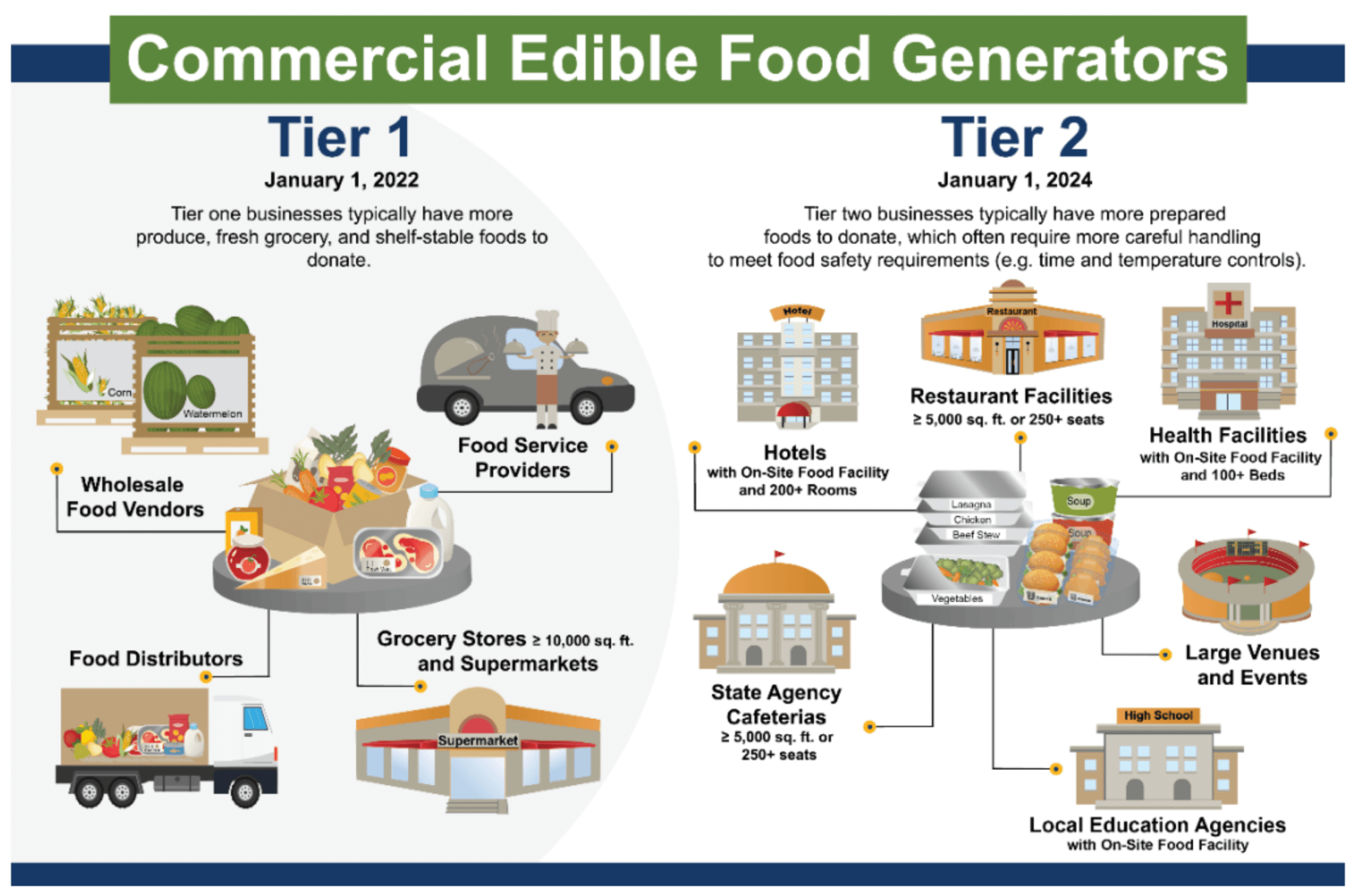By: Ellen Schoenberg – Project Manager
Background
In America, food waste is the largest contributor to municipal solid waste in landfills. According to the FDA, a staggering 30 – 40% of America’s food supply goes to waste. This waste equals over 133 billion pounds of food and over $161 billion worth of food. In fact, the harmful carbon dioxide emissions generated from food waste sitting in landfills are equivalent to 42 coal-fired power plants. Yet simultaneously, 1 in 8 Americans are food insecure.
SB-1383
To address these concerns in his state, in 2016, California Governor Edmund Brown Jr. signed California’s Short-Lived Climate Pollutant Reduction Strategy (commonly referred to as SB-1383) into law. This law has two goals:
- Reduce organic waste disposal by 75% in California by 2025
- Rescue at least 20% of California’s currently disposed surplus food for people to eat by 2025
SB-1383 Compliance
These goals aim to simultaneously combat food waste and food insecurity in California. In order to achieve these two goals, the law requires food-generating businesses in California to donate any surplus food they may generate to a local nonprofit that distributes food to community members in need.
Legal Requirements
Tier 1 and Tier 2 food-generating businesses are legally required to donate their surplus food. They must also have a written agreement with a local food recovery organization or nonprofit. According to CalRecycle, these written agreements “add a layer of food safety, professionalism, and reliability into food recovery and can also serve as a mechanism to help protect food recovery organizations and services from donation dumping.” For each donation, businesses must track the size of the donation, frequency of donations, and type of donation to present during government compliance inspections.

Legal Consequences
If businesses refuse to donate their surplus food, they will face legal consequences. According to CalRecycle, “For violations occurring after January 1, 2024, the jurisdiction shall issue a Notice of Violation requiring compliance within 60 days. If after 60 days, the entity is still not in compliance, the jurisdiction shall impose penalties.” The penalties for businesses who refuse to comply are as follows:
- First violation: $50-$100 per violation
- Second violation: $100-$200 per violation
- Third or subsequent violation: $250-$500 per violation
A SB-1383 Compliance Solution: FoodRecovery.org
At FoodRecovery.org, we are a solution for businesses looking to comply with this law. We use our online database to help restaurants, warehouses, grocery stores, and event venues donate their surplus food to local nonprofits including food pantries, churches, and emergency shelters. We recovered and donated over 52 million pounds of food and supplies last year, we hope to recover even more food in 2024!
There are many benefits for donating food with FoodRecovery.org!
- We provide written agreements to California food-generators willing to donate food
- We keep track of all donations for SB-1383 compliance and because food donations are tax-deductible
- Our platform is completely free to use!
- Donations do not need to be regular and we have no minimum donation requirements. We’ve taken donations from 10 lbs to 40,000 lbs.
- We offer free transportation for donations over 40 pounds
- Businesses are not liable for any food donated in good faith under the Food Donation Improvement Act
If your California business would like to donate food to comply with SB-1383, please email California@foodrecovery.org or call (202) 449-1507.
References:
- “California’s Short-Lived Climate Pollutant Reduction Strategy.” CalRecycle Home Page, CA.gov, calrecycle.ca.gov/organics/slcp/. Accessed 21 Apr. 2024.
- “Food Loss and Waste.” U.S. Food and Drug Administration, FDA, https://www.fda.gov/food/consumers/food-loss-and-waste.
- Buzby, Jean. “Food Waste and Its Links to Greenhouse Gases and Climate Change.” USDA, 24 Jan. 2022, www.usda.gov/media/blog/2022/01/24/food-waste-and-its-links-greenhouse-gases-and-climate-change#:~:text=EPA%20estimated%20that%20each%20year,42%20coal%2Dfired%20power%20plants.
- Bernhardt C, King C. Telehealth and food insecurity screenings: challenges and lessons learned. Mhealth. 2022 Jan 20;8:10. doi: 10.21037/mhealth-21-31. PMID: 35178441; PMCID: PMC8800207.
- “Frequently Asked Questions about Implementing SB 1383.” CalRecycle , calrecycle.ca.gov/organics/slcp/faq/. Accessed 21 Apr. 2024.
“Enforcement Questions and Answers.” CalRecycle , calrecycle.ca.gov/organics/slcp/faq/enforcement/. Accessed 21 Apr. 2024.
